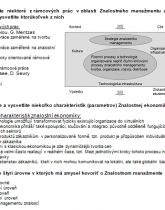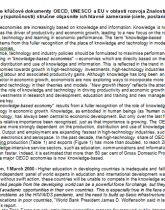Poznámky: Vypracované otázky na skúšku z predmetu Znalostný manažment
Skryť detaily | Obľúbený- Kvalita:88,2 %
- Typ:Poznámky
- Univerzita:Paneurópska vysoká škola
- Fakulta:Fakulta ekonómie a podnikania
- Kategória:Ekonomika
- Podkategória:Management
- Predmet:Znalostná ekonómia a manažment
- Ročník:2. ročník
- Rozsah A4:7 strán
- Zobrazené:2 191 x
- Stiahnuté:12 x
- Veľkosť:0,1 MB
- Formát a prípona:MS Office Word (.doc)
- Jazyk:slovenský
- ID projektu:8445
- Posledna úprava:07.03.2018
1A) Uveďte kľúčové dokumenty OECD, UNESCO a EU v oblasti rozvoja Znalostnej ekonomiky (spoločnosti) stručne objasnite ich hlavné zameranie (ciele, poslanie)
The OECD economies are increasingly based on knowledge and information. Knowledge is now recognised as the driver of productivity and economic growth, leading to a new focus on the role of information, technology and learning in economic performance. The term “knowledge-based economy” stems from this fuller recognition of the place of knowledge and technology in modern OECD economies.
OECD science, technology and industry policies should be formulated to maximise performance and well-being in “knowledge-based economies” - economies which are directly based on the production, distribution and use of knowledge and information. This is reflected in the trend in OECD economies towards growth in high-technology investments, high-technology industries, more highly-skilled labour and associated productivity gains. Although knowledge has long been an important factor in economic growth, economists are now exploring ways to incorporate more directly knowledge and technology in their theories and models. “New growth theory” reflects the attempt to understand the role of knowledge and technology in driving productivity and economic growth. In this view, investments in research and development, education and training and new managerial work structures are key.
The term “knowledge-based economy” results from a fuller recognition of the role of knowledge and technology in economic growth. Knowledge, as embodied in human beings (as “human capital”) and in technology, has always been central to economic development. But only over the last few years has its relative importance been recognised, just as that importance is growing. The OECD economies are more strongly dependent on the production, distribution and use of knowledge than ever before. Output and employment are expanding fastest in high-technology industries, such as computers, electronics and aerospace. In the past decade, the high-technology share of OECD manufacturing production (Table 1) and exports (Figure 1) has more than doubled, to reach 20-25 per cent. Knowledge-intensive service sectors, such as education, communications and information, are growing even faster. Indeed, it is estimated that more than 50 per cent of Gross Domestic Product (GDP) in the major OECD economies is now knowledge-based.
The OECD economies are increasingly based on knowledge and information. Knowledge is now recognised as the driver of productivity and economic growth, leading to a new focus on the role of information, technology and learning in economic performance. The term “knowledge-based economy” stems from this fuller recognition of the place of knowledge and technology in modern OECD economies.
OECD science, technology and industry policies should be formulated to maximise performance and well-being in “knowledge-based economies” - economies which are directly based on the production, distribution and use of knowledge and information. This is reflected in the trend in OECD economies towards growth in high-technology investments, high-technology industries, more highly-skilled labour and associated productivity gains. Although knowledge has long been an important factor in economic growth, economists are now exploring ways to incorporate more directly knowledge and technology in their theories and models. “New growth theory” reflects the attempt to understand the role of knowledge and technology in driving productivity and economic growth. In this view, investments in research and development, education and training and new managerial work structures are key.
The term “knowledge-based economy” results from a fuller recognition of the role of knowledge and technology in economic growth. Knowledge, as embodied in human beings (as “human capital”) and in technology, has always been central to economic development. But only over the last few years has its relative importance been recognised, just as that importance is growing. The OECD economies are more strongly dependent on the production, distribution and use of knowledge than ever before. Output and employment are expanding fastest in high-technology industries, such as computers, electronics and aerospace. In the past decade, the high-technology share of OECD manufacturing production (Table 1) and exports (Figure 1) has more than doubled, to reach 20-25 per cent. Knowledge-intensive service sectors, such as education, communications and information, are growing even faster. Indeed, it is estimated that more than 50 per cent of Gross Domestic Product (GDP) in the major OECD economies is now knowledge-based.


